| Traffic | Weather | Your account | Movies | Restaurants | Today's events |
|
|
Monday, June 20, 2005 - Page updated at 10:46 AM Boeing stumbles in race for China Seattle Times business reporter XIAMEN, China — In the CEO's office at Xiamen Airlines, one of Boeing's most loyal customers sits beside a portrait of Mao and a photo of a 737 cockpit and describes the humiliation he felt trying to enter the U.S. last year. Wu Rongnan runs the only domestic carrier in China that still has an all-Boeing fleet. As he takes a long draw on an English 555-brand cigarette, however, the 62-year-old Wu says the affronts he experienced on his way to Seattle in December were "a bitter pill." To obtain a visa, he spent three hours in line at the American consulate in far-off Guangzhou — and was fingerprinted, something he considers suitable only for criminals. Then, at the immigration counter in Los Angeles, he was treated rudely and escorted to a room for questioning, despite the invitation from Boeing in his hand. "It must be that America is so rich they don't want our money," he said. Wu's reaction is a symptom of problems that have compounded to erode Boeing's longtime dominance in China, handing the advantage to aggressive European rival Airbus in the world's most promising growth market. Some of the problems — the visa issues and political friction over Taiwan — are beyond Boeing's control. But others stem from the company's own mistakes, according to interviews with a range of Chinese airline executives, government officials, former Boeing employees and others.
One manager at China Southern Airlines, China's largest domestic airline, invokes a Chinese proverb to describe Boeing's behavior: "Pick up a sesame seed, lose sight of a watermelon." In other words, Boeing lost sight of the big picture. "They've been rather dense in their dealings with China," said Sidney Rittenberg, a noted China expert and business consultant. "People they've had working with China were not that good at reading cross-cultural issues and dealing with the Chinese. The Airbus people have made a science out of it." Ten years ago, more than eight out of every 10 commercial jets flown in China were Boeing planes. Now about six of 10 are. Airbus' share of new airplane deliveries to China rocketed from 18 percent in 1993 to 67 percent last year, according to Back Aviation Solutions. This bustling city on China's southeastern coast illustrates the potential that China holds for both companies. Business travelers from nearby Taiwan are multiplying rapidly. So are local customers like the stylish young tourists strolling along the city's picturesque boardwalk. In the next two decades, Chinese airlines are expected to triple their fleets, adding 2,300 jets worth nearly $200 billion. Recent evidence suggests Boeing may be pulling itself out of its decade-long downturn in China. It hired a veteran China executive to head its Beijing office and improve relations with government leaders. It bounced back strongly this year with the sale of 60 of its new 787 jets to Chinese airlines. While these are promising signs for Boeing, regaining its dominant role in China may require corporate leadership that is more nimble, humble and ethnically diverse. History Pioneering spirit drives Boeing's early success Boeing sold its first airplanes to the People's Republic of China in 1972, six years before the United States had formal diplomatic relations with the country. The company blazed a trail of airplane sales right on the heels of President Nixon's historic visit. The first 10 707s it sold had to be delivered to China in 1974 by Boeing crews — the Chinese couldn't take possession in the United States, since their assets were still subject to seizure. A pioneering spirit drove Boeing's early efforts, said James Chorlton, one of the first Boeing salesmen sent to China. "We used to have people fighting for a chance to go to China," he said. "We wanted to help this country get started. They didn't have enough roads or enough railways, and a billion people were starting to move around." The Chinese found Boeing planes superior to their existing Russian prop planes and British Trident jets. But no business in China gets very far without strong personal relationships, or "guanxi." The personal friendships between Boeing employees and their Chinese counterparts created the glue to cement the deals. "We developed a rapport with the Chinese at all levels that was very, very strong," said Chorlton, who retired in 1991 as vice president for sales in Asia. He still keeps in touch with former customers and counts them among his closest friends. Matt Chen became Chorlton's right-hand man. Chen, an unassuming young engineer whose parents fled China in 1949, rose through the ranks to become one of Boeing's chief deal makers in China. When Chinese leader Deng Xiaoping visited Boeing's Everett plant in 1979, it was Chen who accompanied him and translated for Boeing CEO Thornton "T" Wilson. Though based in the U.S., Chen gradually built a network of customers in almost every corner of China. "He was a hero for Boeing in China," said Wang Xiaowan, a professor at Beijing University of Aeronautics and Astronautics who translated airplane operating manuals into Chinese for Boeing. "After he left, Boeing had no way to develop business, because they had no friends," she said. Chen recalls a deal he salvaged in 1991. China Southern Airlines, one of his biggest customers, was considering buying Airbus planes instead of Boeing's forthcoming 777. He rushed to Paris to meet with Yu Yanen, then chairman of China Southern, who was scheduled to travel to Airbus headquarters the next day. Over dinner, Chen briefed the Chinese executive on the merits of the 777 and proposed a leasing plan to fill a gap in China Southern's fleet until the new plane was ready. The two toasted each other with a generous amount of scotch, Chen said. The next day, Yu never met with Airbus. China Southern became one of the first buyers of the 777. For two decades, Chorlton said, "We had the whole thing locked up." Glass ceiling Deal maker retires rather than complain As the new competitor Airbus entered the market, said former company executives and Chinese customers, Boeing suffered from missed opportunities, arrogance and complacency. The company became a victim of its own success. "Boeing had the typical complex of being on top of the world," said Peter Chang, managing director of China Aviation Marketing and senior vice president of Boullioun Aviation Services. While Airbus gained momentum, Boeing's senior management seemed distracted by events at home. In the late 1990s, huge production swings were followed by rounds of layoffs. Boeing's merger with McDonnell Douglas in 1997 vastly expanded the military side of its business. "Management became very self-absorbed," Chang said. "In a marketplace where your competitor is busily courting new customers, there was a high cost to be paid." In the aviation industry, regaining lost customers is much harder than holding onto them. "Switching is complicated, expensive and exhausting," Chang said, because it might mean replacing a company's computer system and retraining its entire crew. Chen, the deal maker, and other ethnic Chinese employees at Boeing felt they had the skills and ideas to improve the company's relations with China. But they faced a glass ceiling that ultimately limited their influence. Chen thought he would be the natural choice to lead Boeing's expanded office in China. When he wasn't chosen, he never protested. "That's the Chinese in me," he said. "I don't beat my own drum." Instead, after 34 years at Boeing, he retired early in 1994. Upon leaving Boeing, Chen became a vice president at American Airlines, where he spent eight years helping lay the groundwork for its first routes to China. In Asia's other booming market, Boeing hired Dinesh Keskar, a native of India, as its sales chief. Yet even 10 years after Chen's departure, Boeing has not found a manager with his language and cultural ability to head its sales operations in China. "Boeing just never really knew how to keep the relationship going," Chen said. To be successful in China, "They've got to promote Chinese Americans within top management at home," said Jim Eckes, managing director of consulting firm Indoswiss Aviation. Customers complain Gestures overlooked; loyalty begins to erode Early on, Boeing made huge investments to help build Chinese airports and infrastructure. But, thinking they had the market sewn up, managers ignored small things they could do to foster goodwill, said C.C. Tien, an engineer who retired after 34 years at Boeing and now advises China's regional jet program. For instance, he suggested the company sponsor conferences in China or museum exhibitions showing Chinese contributions to engineering. "It's important to show Boeing cares not just about your money, but about what's going on in China," he said. "Those are subtle things. You don't see the direct payback for a long time." Seemingly trivial things made a big difference to China Southern Airlines. A longtime Boeing customer, China Southern has trained its pilots on almost every family of Boeing aircraft from the 737 to the 777. China's current aviation minister started his career as a China Southern pilot. In 1991, Boeing's Matt Chen had persuaded China Southern to buy 72 Boeing airplanes by offering flight simulators and throwing in free software and training to run them. A few years ago, the airline was told it would have to purchase the next batch of software for about $150,000, said Rong Weiguo, deputy manager and maintenance expert at China Southern's Flight Training Center in Zhuhai. In the scale of things, that's a tiny amount to Boeing. "Sesame seeds" compared to "watermelons," Rong said. "We bought so many planes," he said. "For the safety of the plane, this is something they should provide." And more than a year after he asked to purchase the simulator data for the 777-200, Rong says he had not received any reply from Boeing. In January, China Southern became the first Chinese customer for the new Airbus double-deck superjumbo jet, the A380. Chinese airlines and aviation officials also have complained they're not getting adequate training from Boeing. To keep up with demand, China will need 1,200 new pilots a year. A shortage of well-trained pilots and mechanics threatens to slow development of the nation's air travel because authorities worry the market is growing too fast to ensure safety. Conditions in China have improved dramatically since the days when CAAC, the Civil Aviation Authority of China, had a nickname: Chinese Airlines Always Crash. But after a fatal accident last year, CAAC said it would restrict new plane orders for delivery in 2005. Seattle once offered an ideal environment for Boeing to train Chinese pilots, who could also be shown the virtues of Boeing technology. But changes in U.S. immigration policy after the 2001 terrorist attacks make that harder. As a result, Seattle has lost that business from Chinese airlines. Xiamen, which used to send about 50 pilots a year to flight school in the U.S., now sends its pilots to Australia, New Zealand and Europe. As for Xiamen Airlines President Wu, his latest visit in May went more smoothly, though he and his employees found the documents required to enter the U.S. had changed yet again. Boeing's vice president for sales in China, Rob Laird, said many of the Chinese complaints are just a natural part of the buyer-seller relationship — customers routinely demand more from their suppliers. "They will always complain that we don't give them enough discounts, we don't give them enough freebies." He said Airbus gained market share in China by flooding the market with surplus production at discount prices. Laird, who has worked for Boeing since 1981 with extensive experience in Asia, said he doesn't think having Chinese leadership in the China sales team would give Boeing an edge. "It would be good if we could, but it's not an imperative," he said. "In any market, it's not so much ethnic origins or language capability, but what you can do for the customer." Taiwan U.S. government accused of meddling Rising out of Xiamen's grassy landscape, huge red Chinese characters the size of the Hollywood sign send a political message toward nearby Taiwan: "One country, two systems will unify China." The issue of Taiwan overshadows other challenges Boeing faces in China. The tropical seaport of Xiamen bustles with business from overseas Chinese flying in from Bangkok, Hong Kong and Singapore. Leafy gardens and temples with colorful tiles and upturned rooflines make Xiamen gentler and more inviting than most of China's urban metropolises. Its tea shops sell some of the best green tea in the world. But a rocky Taiwanese military outpost within swimming distance of Xiamen is a constant reminder of tensions between the mainland and the democratic island that China considers a breakaway province. Many Chinese blame the United States for meddling in their relations with Taiwan by trying to sell weapons to the island. It's enough to make Xiamen Airlines President Wu question his devotion to Boeing. Wu is friendly and direct. He wears short-sleeved shirts with ties and, working 12-hour days in the warm climate, he takes a nap most afternoons. Mao's little red book of quotations sits in the bookshelf near Wu's oversized desk. China is warming to Europe, and Airbus sales teams are constantly knocking on his door. If the United States arms Taiwan with advanced weapons, he said, his customers would not want to fly in American planes. The stakes for him are high. Xiamen's clean, efficient airport is full of business people traveling to and from Taiwan. If relations improve, Wu hopes to launch a direct air shuttle between the mainland and Taiwan, cutting travel time to 45 minutes for the millions who now must fly hours out of their way through Hong Kong. Politics Europe's friendlier policies toward China are seen as helping Airbus win more sales In China, where the major airlines are government-owned, the central government approves all plane orders and uses them to dole out political rewards. Boeing and Airbus are viewed as direct extensions of the United States and Europe. Lately, the U.S. and Europe have moved in opposite directions, said Ma Xiaowen, a senior consultant for Great Wall Industry, China's state-run aerospace company. The Bush administration proposed an $18 billion package of weapons sales to Taiwan and included Taiwan in its defense pact with Japan. Europe, meanwhile, is moving to lift its ban on military sales to China. Boeing chose Japan as its strategic manufacturing partner for the new 787. Airbus, meanwhile, named China as its partner in the design of the new A350. These decisions have pushed China closer to Europe and helped Airbus win more sales, Ma says. A gregarious man in a long blue overcoat and white tennis shoes, he works from a modest office in Beijing's university district decorated with maps and model planes. Ma pointed out that the Chinese have a nickname for TMD, or Theater Missile Defense, an anti-missile system proposed by President Bush that might be used to defend allies such as Taiwan or American troops abroad. They call it "tamade," a common swear word which roughly translates to "your mama." "There are different political policies in Europe," Ma said. "They don't have anything like 'tamade.' " Boeing looks ahead Sales team expanding; more field engineers As the race for China heats up, the man charged with improving Boeing's relations with China is David Wang. Three years ago, Boeing recruited Wang from General Electric to become president of Boeing China, which handles service and support. It's rare for Boeing to bring in a leader from outside the company — but after doing business in China for 30 years, it had no one inside with a Chinese background to fill the post, Wang said. "This is the first time the company hired someone [as top executive in China] who understands Chinese culture and speaks the language, in a drive to become a long-term partner here," said Wang, 61, who was born near Xiamen in China's Fujian province and moved to the United States for college. He does not have an aviation background, but worked at GE for 20 years and led its medical-equipment sales in China. Wang acknowledged some complaints by Boeing's Chinese customers are valid. The problems Chinese travelers have had getting to the United States "seriously affected our competitiveness," he said. When he heard some of his customers' horror stories, "I almost died," Wang said. Although Boeing and others have complained to the federal government to make the process smoother, some customers have given up. "People have told us, forget it, come and see me instead," Wang said. However, "You can't bring our model facility for the 787 all over the world. It doesn't pack in a suitcase." He also believes better U.S.-China relations would help Boeing's cause. "Clearly our friendship and cooperation will suffer if those relationships are not strong." To build stronger ties, Boeing needs more people on the ground, he said. This year, Boeing intends to expand its workforce in China by 30 percent, he said. The company will add local field engineers and will more than double its existing sales team to 20 people. Boeing is negotiating an agreement to open a maintenance center in Shanghai this year to help support China's growing aviation industry. The $100 million project would be a joint venture with Shanghai Airlines and Shanghai's Pudong Airport and eventually would employ as many as 1,000. In Xiamen, Boeing has invested in a large-scale project employing local workers to convert used 747 passenger jets into air freighters. "I would like to see Boeing become a real force for the local economy in China," Wang said. "Like we are in the U.S." Kristi Heim: 206-464-2718 or kheim@seattletimes.com Copyright © 2005 The Seattle Times Company
|
|
|||||||||||||||||||||||||||||||||||||||||||||||
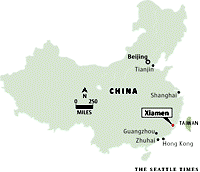
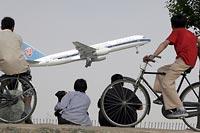
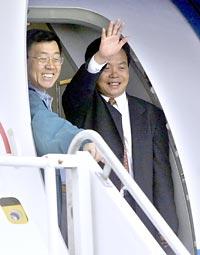
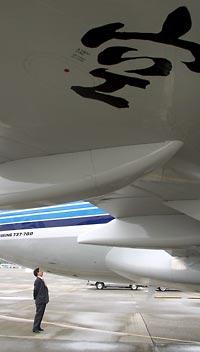
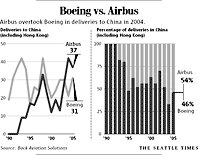
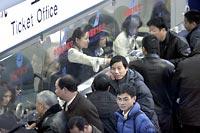
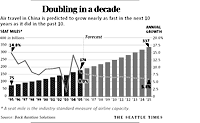
 Instead of profiting, many inventors find the globalized world a difficult place.
Instead of profiting, many inventors find the globalized world a difficult place. With every latte, consumers influence livelihoods and government policies abroad.
With every latte, consumers influence livelihoods and government policies abroad. As globalization changes the high-tech industry, Microsoft is reaching out to the world, exporting not only jobs and products, but lives and values.
As globalization changes the high-tech industry, Microsoft is reaching out to the world, exporting not only jobs and products, but lives and values. Asparagus farming and how globalization is reshaping the Washington economy.
Asparagus farming and how globalization is reshaping the Washington economy.